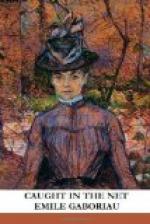“I have learned my lesson, and shall not forget it.”
“You see, doctor, the beauty of the whole affair is, that the Countess will wonder how her husband will take her interference, while he will be at a loss how to break the news to his wife. How surprised they will be when they find that they have both the same end in view!”
There was something so droll in the whole affair, that the doctor burst into a loud laugh.
“We go by such different roads,” said he, “that they will never suspect that we are working together. Faith! my dear Baptiste, you are much more clever than I thought.”
“Don’t praise me until you see that I am successful.”
Mascarin stopped opposite to a cafe in the Faubourg Saint Honore.
“Wait here for me, doctor,” said he, “while I make a little call. If all is all right; I will come for you again; then I will see the Count, and twenty minutes later do you go to the house and ask for the Countess.”
The clock struck four as the worthy confederates parted, and Mascarin continued his way along the Faubourg Saint Honore, and again stopped before a public house, which he entered, the master of which, Father Canon, was so well known in the neighborhood that he had not thought it worth while to have his name painted over the door. He did not profess to serve his best wine to casual customers, but for regular frequenters of his house, chiefly the servants of noble families, he kept a better brand of wine. Mascarin’s respectable appearance inclined the landlord to step forward. Among Frenchmen, who are always full of gayety, a serious exterior is ever an excellent passport.
“What can I do for you, sir?” asked he with great politeness.
“Can I see Florestan?”
“In Count de Mussidan’s service, I believe?”
“Just so; I have an appointment with him here.”
“He is downstairs in the band-room,” replied the landlord. “I will send for him.”
“Don’t trouble; I will go down,” and, without waiting for permission, Mascarin descended some steps that apparently led to a cellar.
“It appears to me,” murmured Father Canon, “that I have seen this cove’s face before.”
Mascarin pushed open a door at the bottom of the flight of stairs, and a strange and appalling noise issued from within (but this neither surprised nor alarmed him), and entered a vaulted room arranged like a cafe, with seats and tables, filled with customers. In the centre, two men, in their shirt sleeves, with crimson faces, were performing upon horns; while an old man, with leather gaiters, buttoning to the knee, and a broad leather belt, was whistling the air the hornplayers were executing. As Mascarin politely took off his hat, the performers ceased, and the old man discontinued his whistling, while a well-built young fellow, with pumps and stockings, and wearing a fashionable mustache, exclaimed,—




